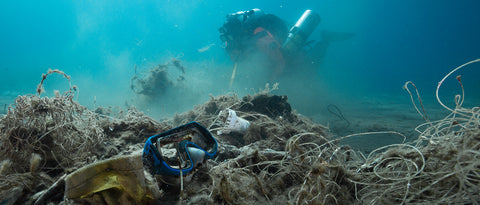" Ghost Fishing " is what fishing tackle does when it has been lost, dumped or abandoned in the water. Nets, longlines, fish traps or any other artificial gear designed to capture fish or marine organisms are considered capable of ghost fishing when left in the water. And without anyone benefiting from their catches, they affect already depleted commercial fish stocks. The captured fish die and in turn attract scavengers who are caught in the same net, thus creating a vicious circle.
The Ghost Fishing Foundation
Divers are all too familiar with the phenomenon of 'ghost fishing', especially in heavily fished areas. The founders of the Ghost Diving organization came across ghost gear when inspecting many wrecks in the Dutch North Sea. In 2009, together with a local team of divers, they started ridding the ocean of ghost fishing gear. After a few years of local efforts, it was time to broaden the horizon and connect with like-minded groups around the world. And so the Ghost Diving Foundation was born.
Since its inception, the Ghost Diving Foundation has worked with various local groups of technical divers and salvage companies around the world to remove abandoned fishing nets from the water. With projects in the North Sea, Adriatic Sea, Aegean Sea, Mediterranean Sea, Caspian Sea, Pacific Ocean and Scapa Flow, they work on existing projects, create new projects and document them through visual media, to inform a large public and raise awareness in society (as is done for eco-responsible swimsuits). The foundation exchanges solutions and good practices by maintaining a constant flow of information through social media and a website that offers a lot of information and opportunities for interaction.
Ghost Diving has recently launched unique collaborations with several well-known organizations like the Healthy Seas Initiative , World Animal Protection and Greenpeace , and its members are part of the Global Ghost Gear Initiative (GGGI). The GGGI aims to improve the health of marine ecosystems, protect marine animals and safeguard human health and livelihoods. Launched in September 2015, the GGGI is the first initiative dedicated to tackling the problem of ghost fishing nets on a global scale. The strength of the GGGI lies in the diversity of its participants, including the fishing industry, the private sector, academia, governments, intergovernmental and non-governmental organizations.

photo credit: GhostDiving.org
The missions of the Ghost Diving Foundation
The foundation works in collaboration with other diving teams around the world and makes it a point of honor to initiate or participate in existing projects around the world. Its mission is to:
Physically remove nets, fishing gear and other marine debris : Over the past 8 years, the foundation has removed a tremendous amount of nets, fishing gear and other marine debris from shipwrecks, reefs and seabed. This allowed members to accumulate in-depth experience and build their own techniques.
Investigate and document local situations : All these finds are illustrated with photos and videos. The team therefore works with professional underwater photographers and filmmakers and always documents its actions for evaluation and presentation purposes.
Recycle marine debris: Certain types of marine debris such as fishing nets and weights (lead) can be used in recycling processes. Thus the team collects these materials and wishes to cooperate with companies specialized in recycling processes. Like those that allow the manufacture of ethical swimsuits.
Sharing knowledge and best practices : Over the years, the Ghost Diving Foundation has acquired in-depth knowledge of many types of fishing techniques, marine litter and also marine life. She shares her knowledge and is ready to learn from others.
Educate and present : The foundation makes educational presentations to (diving) clubs and at meetings, organizes exhibitions and shows to promote its cause.
You too can act on your side by starting, for example, by buying sustainable swimsuits for the beach;)


